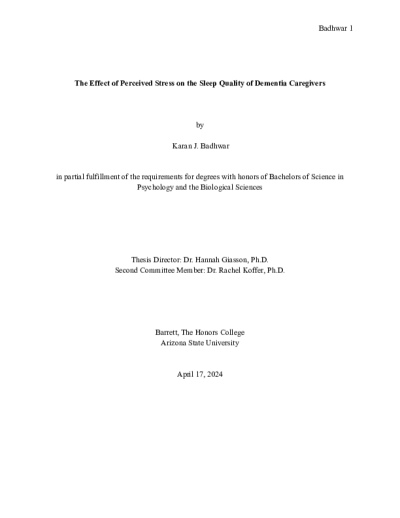Filtering by
- Creators: Department of Psychology
- Creators: Edson College of Nursing and Health Innovation
- Creators: Aldana, Lauren Michelle


DESIGN: Patient charts were reviewed to obtain demographic information, medications, and patients' progress throughout stay including pharmacologic and non-pharmacologic interventions and results. Patients were then interviewed using the short portable mental status questionnaire.
SETTING: The prevalence and management of dementia and delirium was evaluated in 10 Hospice of the Valley inpatient settings.
RESULTS: Out of the 159 participants (mean age = 77.72 years), 93 (58.5%) presented with moderate to severe cognitive impairment, but only 38 participants (23.9%) had a formal diagnosis of dementia. Out of the 93 participants with significant cognitive impairment, 60 participants (65.6%) were treated with benzodiazepines and 82 (88.2%) were treated with opioids. Fifty-nine (63.4%) participants with cognitive impairment had documented non pharmacological interventions such as repositioning and reorientation, but only 22 (23.7%) participants received more meaningful non-pharmacological interventions such as hand massages, targeted videos, and favorite music.
CONCLUSIONS: The current study found a high prevalence of moderate to severe cognitive impairment without a diagnosis of dementia. A likely cause is the high frequency of opioids and benzodiazepines prescribed, causing drug-induced sedation and delirium which significantly impairs cognitive abilities. Safer alternatives, such as non-opioid pain medications, should be considered within the hospice population, especially given that age is a risk factor for delirium. A tool would be helpful to encourage staff to identify and document use of non-pharmacological interventions.

Minority mental health patients face many health inequities and inequalities that may stem from implicit bias and a lack of cultural awareness from their healthcare providers. I analyzed the current literature evaluating implicit bias among healthcare providers and culturally specific life traumas that Latinos and African Americans face that can impact their mental health. Additionally, I researched a current mental health assessments tool, the Child and Adolescent Trauma Survey (CATS), and evaluated it for the use on Latino and African American patients. Face-to-face interviews with two healthcare providers were also used to analyze the CATS for its’ applicability to Latino and African American patients. Results showed that these assessments were not sufficient in capturing culturally specific life traumas of minority patients. Based on the literature review and analysis of the interviews with healthcare providers, a novel assessment tool, the Culturally Traumatic Events Questionnaire (CTEQ), was created to address the gaps that currently make up other mental health assessment tools used on minority patients.

For those living lives devoted to taking care of others, it can be difficult to remember to take care of themselves. This thesis project is a review of quantitative and qualitative literature pertaining to self-care for the caregivers of Alzheimer's and dementia patients. Three nursing diagnoses and related nursing interventions were created using data from the evidence-based literature. With the proper knowledge and assistance, caregivers can better prepare for the future and participate in health-promoting self-care activities which may improve their quality of life.
Objective: The purpose of this meta-analysis is to identify if one atypical antipsychotic (risperidone, aripiprazole, olanzapine, clozapine, quetiapine) is more effective in treating behavioral and psychological symptoms of dementia (BPSD). The secondary aim is to identify a difference in dosage between the atypical antipsychotics when used to treat BPSD. Methods: Articles regarding atypical antipsychotics and BPSD were located on the Arizona State University Library website and Google Scholar. A total of 13 studies were included in analyses. The mean difference of the measurement of BPSD from baseline to end of study were extracted from the studies, converted to z-scores using standard error, and the average was found for each medication and placebo groups. Data on dosage was also collected and the total mg of medication for an average participant was calculated based on type of medication. Two ANOVAs were conducted: one to identify a significant difference between the average effect of each medication on BPSD and another to identify a significant difference between the level of dosage given on average for each medication. Results: These analyses indicated that there was no significant difference between individual atypical antipsychotics or placebo (F(5,19) = 0.254, p = 0.932). There was a significant difference in level of dosage with quetiapine having a significantly higher dosage on average than every other medication (F(4,12) = 18.49, p = 0.0000456). Conclusions: There is a lack of evidence that supports the use of atypical antipsychotics for the treatment of BPSD, however, future research that focuses on lower doses of these medications and interactions with psychotherapy may prove beneficial.



This narrative literature review explores how perceived stress affects sleep quality in dementia caregivers by examining various factors. Ten studies from 2013 to 2022 across four continents were analyzed, focusing on caregiver stress levels, sleep quality, caregiver burden, and depression. Higher stress levels were linked to poorer sleep quality, alongside factors like emotional distress and disrupted sleep patterns. The findings highlight the importance of targeted interventions to reduce stress and improve sleep quality among dementia caregivers, suggesting the need for longitudinal and empirical studies with standardized measures for a better understanding.